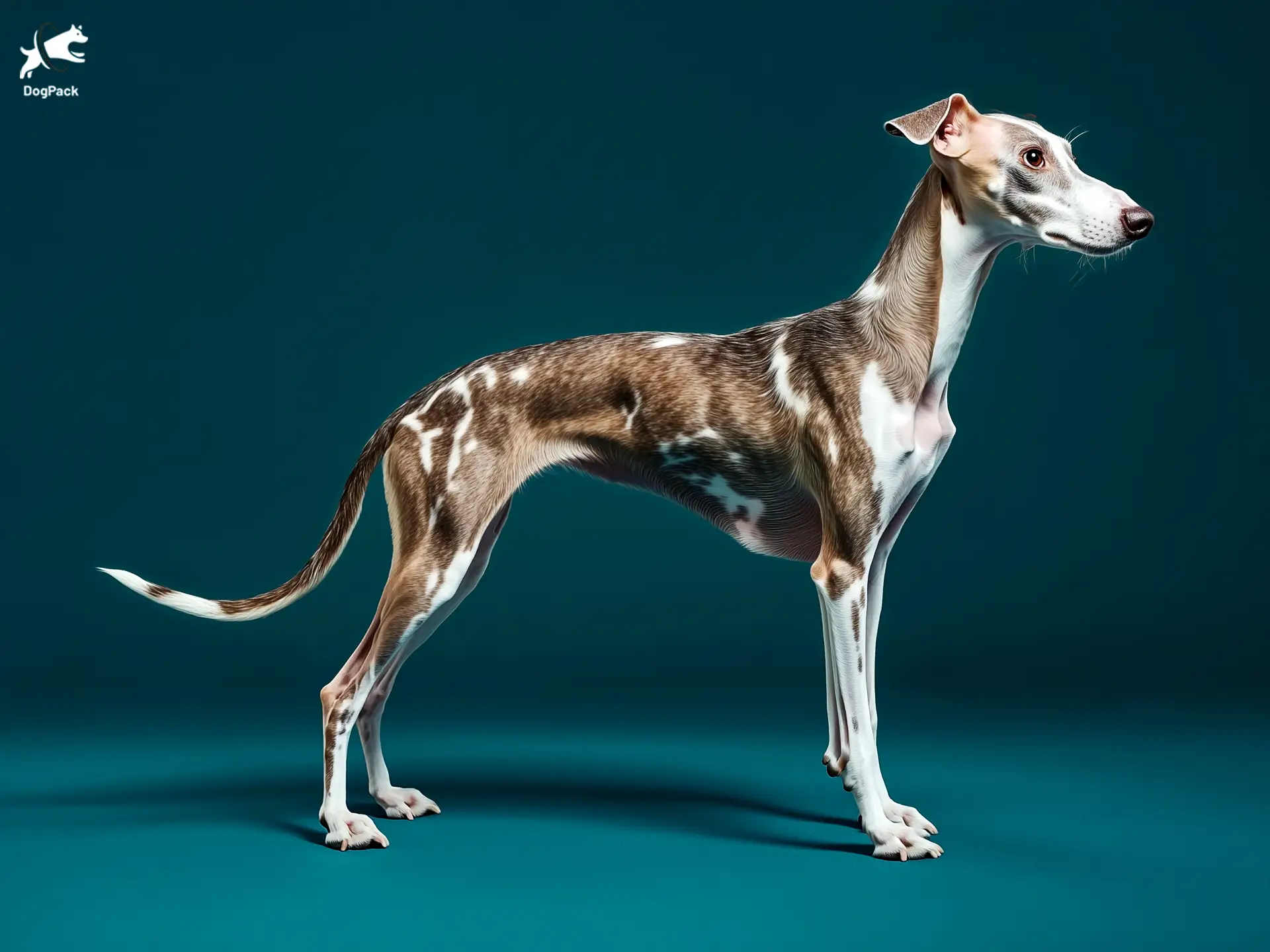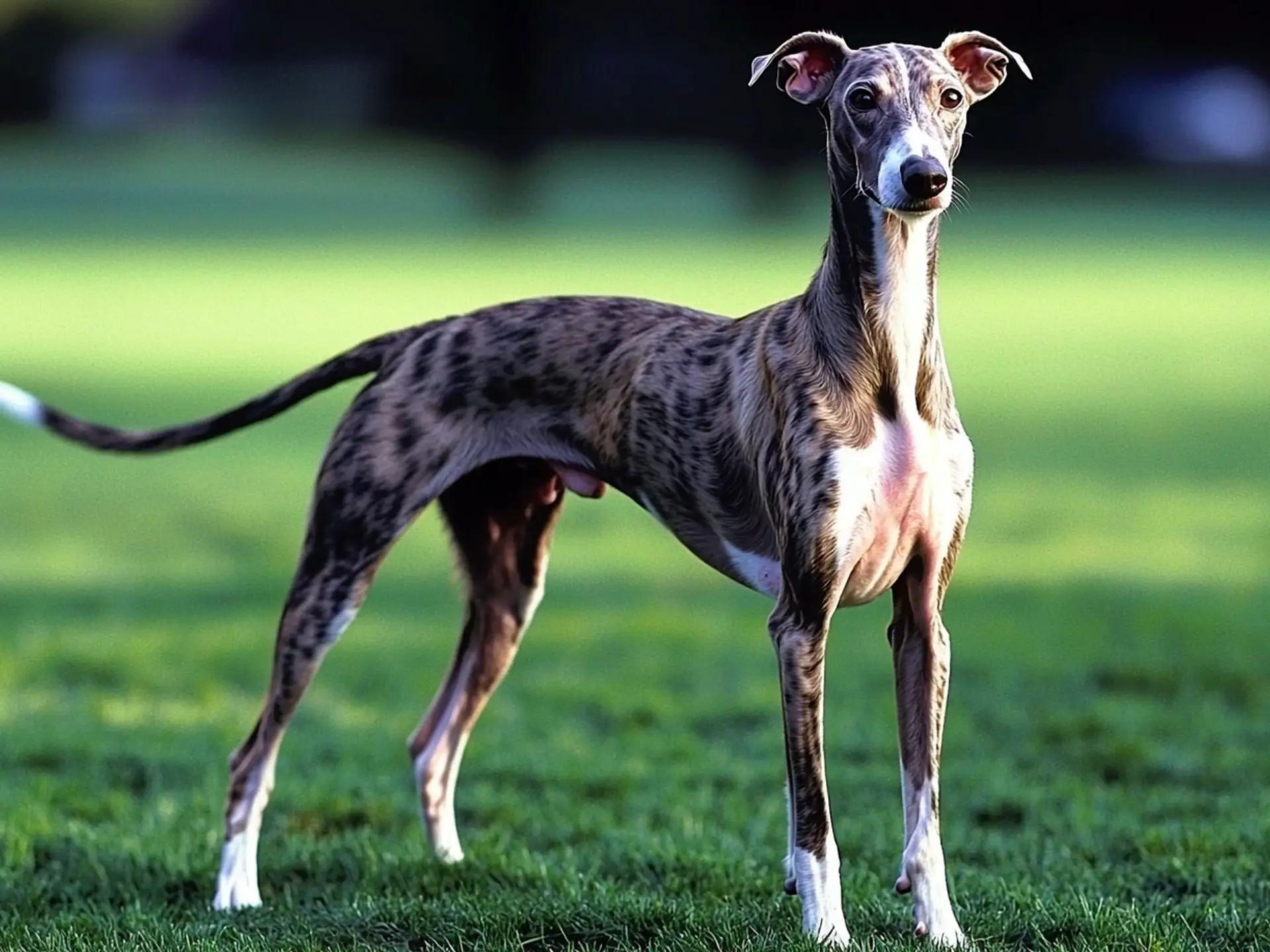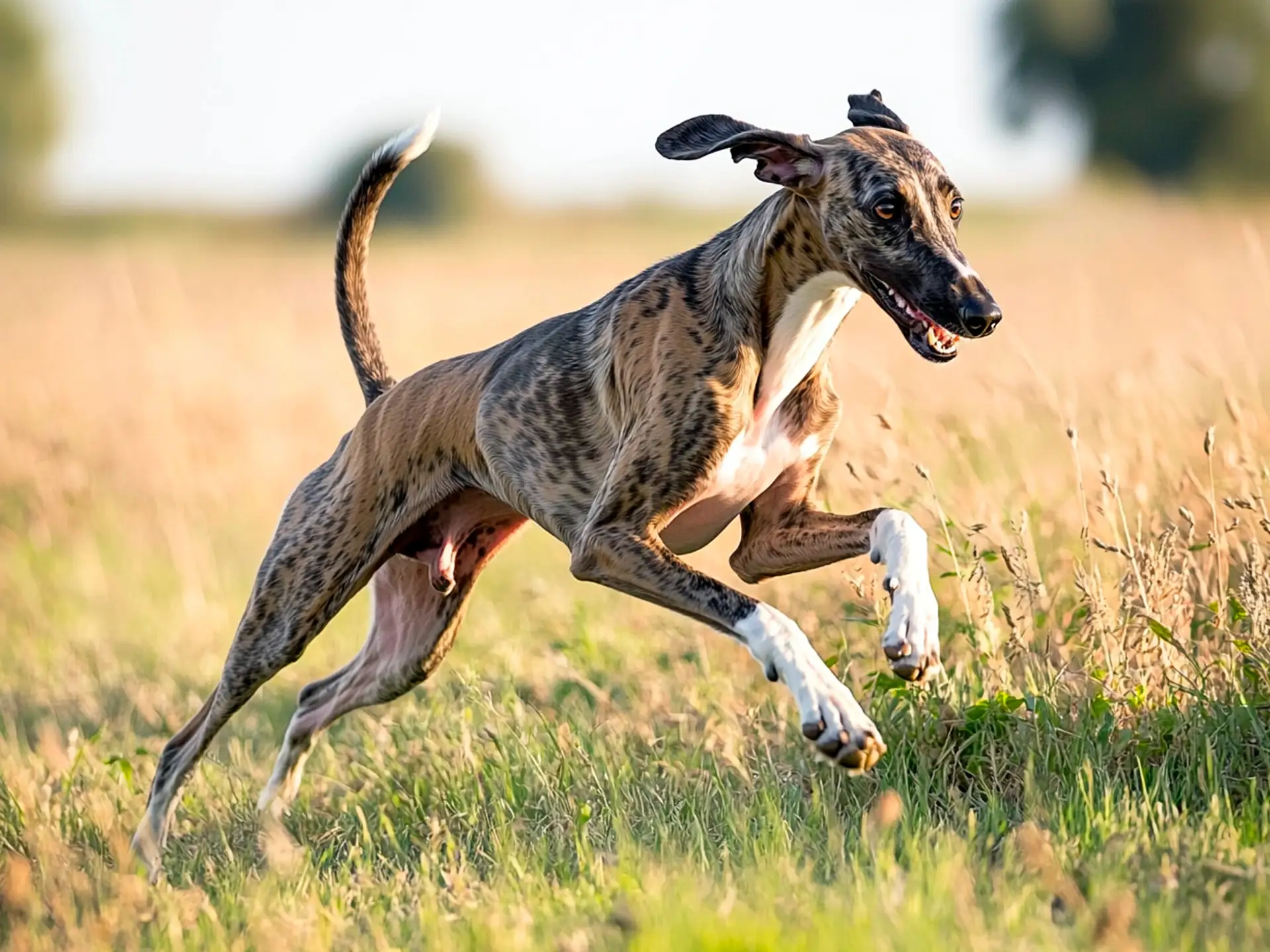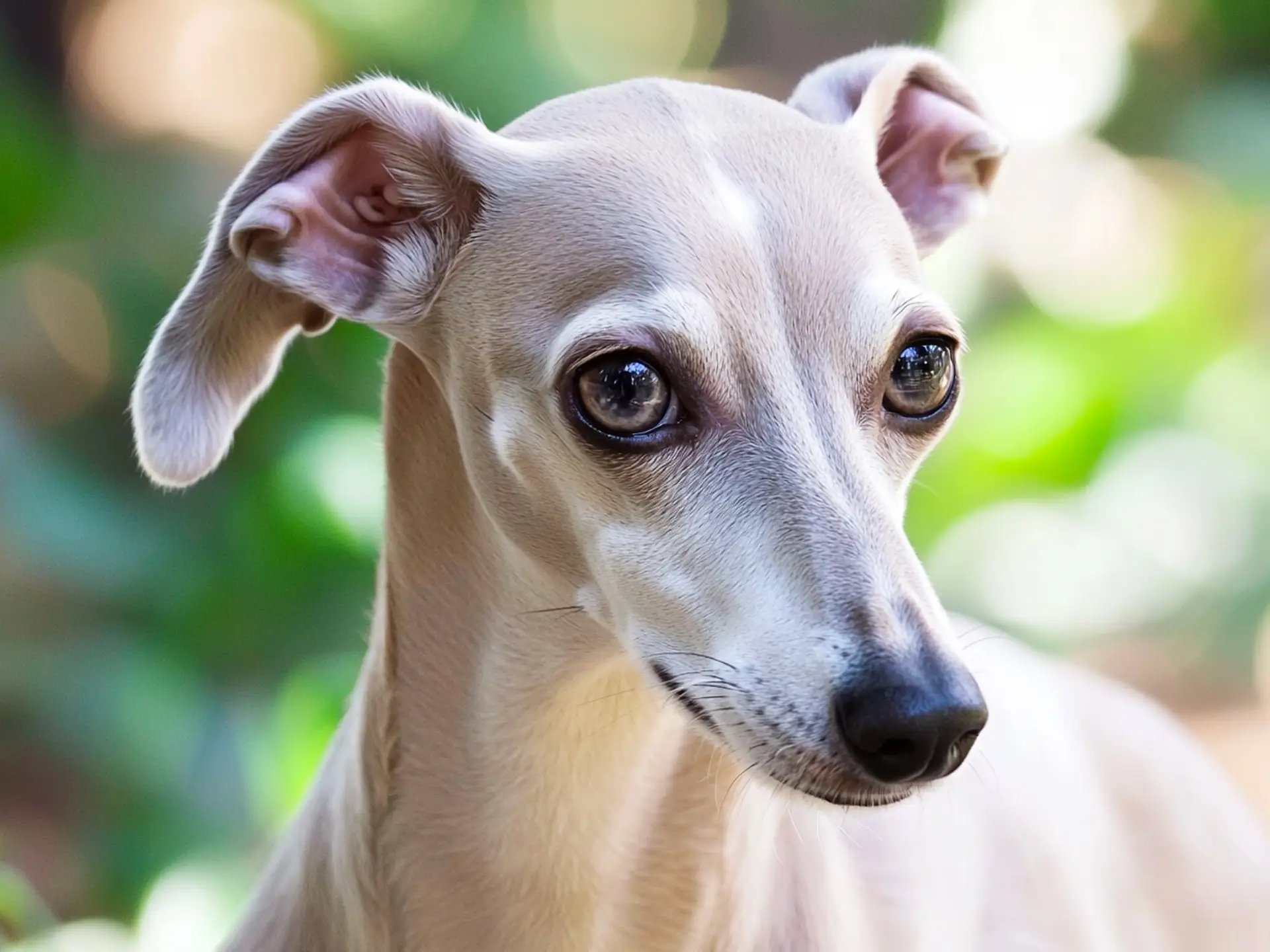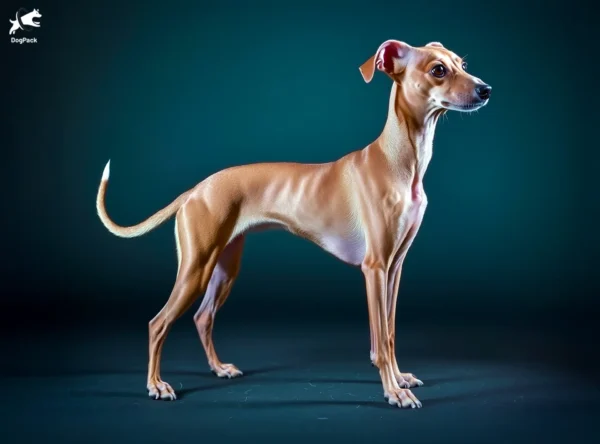Whippet Dog Breed Info & Overview
The Whippet, with its sleek build and impressive speed, is the perfect blend of sprinter and snuggler. Known for their gentle and affectionate nature, these graceful dogs thrive on a quick dash outdoors followed by a cozy nap at home. Combining athleticism with laid-back charm, Whippets make wonderful companions for those seeking both energy and relaxation in a pet.
Characteristics
Pictures
Breed History
The Whippet’s story begins in 19th-century England among coal miners who desired a swift yet compact dog for racing and hunting small game. By crossing Greyhounds with terriers, they created the Whippet, affectionately known as the “poor man’s racehorse.” These dogs excelled in local “rag races” and rabbit hunting, becoming a staple in working-class communities.
As their reputation for speed and agility grew, Whippets transitioned from racing fields to hearths, becoming cherished family companions. Their gentle nature made them ideal pets, balancing athletic abilities with a calm demeanor at home. This versatility contributed to their spread beyond England to Europe and North America.
In the early 20th century, Whippets arrived in the United States, quickly gaining recognition from the American Kennel Club in 1888. They became favorites in both racing circuits and dog shows. Today, the Whippet is celebrated worldwide for elegance, speed, and affectionate companionship—a testament to its rich heritage.
Temperament, Personality
Whippets are known for their gentle and affectionate temperament. They form strong bonds with their families and are often called “Velcro dogs” because they love being close to their humans. Despite their athleticism, they are surprisingly calm indoors, making them excellent companions for those seeking a relaxed household pet.
Around children, Whippets are typically patient and loving, though supervision is recommended with very young kids due to the dog’s delicate build. They generally get along well with other dogs, especially if socialized early. However, their strong prey drive may incline them to chase smaller animals, so caution is advised with cats and small pets.
Strangers are usually met with polite reserve by Whippets. They’re not aggressive or overly protective, but their quiet nature can make them good watchdogs who alert you to unusual happenings. Overall, their balanced temperament combines affectionate loyalty with a laid-back demeanor, suiting various household types.
Physical Characteristics
Whippets are medium-sized dogs with a sleek, athletic build. Standing between 18 to 22 inches tall and weighing around 25 to 40 pounds, they have streamlined, muscular bodies designed for speed and agility. With a deep chest and narrow waist, they resemble a smaller version of the Greyhound.
Their coat is short, smooth, and comes in a variety of colors and patterns, including brindle, fawn, black, white, and combinations thereof. The minimal coat requires little grooming but offers little insulation, making Whippets sensitive to cold weather. Their expressive eyes and small, folded ears add to their elegant appearance.
One distinctive feature of the Whippet is its effortless, graceful movement. When running, they exhibit a double-suspension gallop, allowing them to reach speeds up to 35 miles per hour. This physical prowess, combined with their elegant form, makes them stand out both on the racetrack and in the living room.
Health Issues
Whippets are generally healthy, but like all breeds, they’re prone to certain health conditions. One common issue is deafness, which can occur congenitally. Regular hearing tests are advisable. They may also be susceptible to eye disorders like progressive retinal atrophy, so annual eye exams are important.
Cardiac problems such as mitral valve disease can occur in Whippets. Regular veterinary check-ups can help detect and manage these conditions early. Additionally, due to their low body fat, they are sensitive to anesthesia and certain medications. Always consult a vet familiar with the breed’s specific needs.
Whippets have thin skin that can be prone to cuts and tears, especially during vigorous play or racing. Maintaining a safe environment and monitoring outdoor activities can minimize injuries. Overall, with proper care and regular veterinary attention, Whippets enjoy a lifespan of 12 to 15 years.
Grooming Needs
Whippets are low-maintenance when it comes to grooming. Their short, smooth coat sheds minimally and requires only occasional brushing to remove loose hairs and keep it shiny. A soft-bristle brush or grooming glove works well for this purpose. Bathing is needed only when they get particularly dirty.
Due to their thin skin and low body fat, Whippets can feel the cold more than other breeds. In cooler climates, they may need a dog sweater or coat during walks. Their ears should be checked regularly for signs of infection, and their nails trimmed monthly to prevent overgrowth.
Dental hygiene is essential for Whippets. Brushing their teeth several times a week helps prevent tartar buildup and periodontal disease. Regular dental chews and professional cleanings can also contribute to good oral health. Overall, their grooming routine is straightforward, making them suitable for owners seeking a low-fuss pet.
Exercise Requirements
While Whippets are known for their speed, they don’t require endless exercise. About an hour of daily activity suffices to keep them happy and healthy. This can include brisk walks, playtime in a securely fenced yard, or supervised sprints at a dog park. They love to run but are equally content to lounge afterward.
Due to their strong prey drive, it’s crucial to keep Whippets leashed or in enclosed areas during exercise. They may bolt after small animals without warning. Mental stimulation is also important; puzzle toys and obedience training can keep their intelligent minds engaged.
Whippets excel in canine sports like lure coursing and agility, which tap into their natural speed and agility. Participating in these activities can strengthen your bond and provide excellent outlets for their energy. Despite their athleticism, they adapt well to apartment living as long as their exercise needs are met.
Training Tips
Whippets are intelligent and eager to please, which generally makes training a positive experience. However, they can also be sensitive and may not respond well to harsh training methods. Using positive reinforcement techniques like treats and praise will yield the best results.
Consistency is key when training a Whippet. Early socialization and puppy training classes are recommended to help them become well-adjusted adults. They may have a stubborn streak, so patience is important. Short, engaging training sessions will keep them interested without overwhelming them.
Recall training is particularly crucial due to their prey drive. Teaching your Whippet to come when called can prevent them from chasing after squirrels or other small animals. Incorporating games and varied activities can make training enjoyable for both you and your dog.
Nutrition, Diet
Feeding a Whippet requires attention to their unique energy needs. A diet rich in high-quality proteins supports their lean muscle mass. Typically, they do well on 1 to 1.5 cups of premium dry dog food split into two meals per day. Adjust portions based on age, activity level, and metabolism.
Whippets can be prone to weight gain if overfed, despite their athletic build. Monitoring their calorie intake and providing regular exercise helps maintain a healthy weight. Some may have food sensitivities, so consult your vet if you notice any digestive issues or skin problems.
Including omega-3 fatty acids in their diet can promote a healthy coat and skin. Whether through specialized dog food or supplements recommended by a veterinarian, these nutrients support overall health. Fresh water should always be available, and treats should be given in moderation to prevent obesity.
Adoption, Breeders
If you’re considering adding a Whippet to your family, adoption is a wonderful option. Organizations like the American Whippet Club Rescue specialize in rehoming Whippets in need. Adopting gives a dog a second chance at a loving home.
For those interested in purchasing from a breeder, it’s crucial to choose a reputable one who prioritizes health and temperament. Visit the breeder’s facility to meet the puppies and their parents. Ensure they provide health clearances for common issues like cardiac and eye conditions.
Avoid puppy mills or irresponsible breeders who can’t provide proper documentation. Resources like the AmericanKennel Club’s Breeder Referral can guide you to trusted breeders. Whether adopting or buying, thorough research ensures you find a healthy, happy Whippet.
Family Pet?
Whippets make excellent family pets due to their gentle and affectionate nature. They thrive on human companionship and are known to be particularly good with children who treat them respectfully. Their calm indoor demeanor means they’re unlikely to be hyperactive around the house.
Their size is manageable for most households, and they adapt well to different living environments, including apartments. However, because they form strong bonds, they don’t like being left alone for extended periods. Families that can provide ample attention will find a loyal and loving companion in a Whippet.
Interactions with other pets can vary. While Whippets generally get along with other dogs, their prey drive can make cohabitation with smaller animals challenging. Early socialization and careful introductions are key if you have cats or small pets.
Right For You?
If you’re seeking a dog that’s both athletic and a couch companion, the Whippet might be right for you. They’re well-suited for individuals or families who can provide daily exercise and plenty of affection. Their low grooming needs and adaptable nature make them a good fit for various lifestyles.
Apartment dwellers will appreciate their quiet indoor behavior, but they do need access to safe spaces for running. If you have a securely fenced yard or nearby dog park, that’s a plus. Keep in mind their sensitivity to cold and desire for close human interaction.
Potential owners should be prepared for their strong prey drive, which requires diligence during walks and outdoor activities. If you value a gentle, loving companion who also enjoys bursts of high-speed fun, the Whippet could be your ideal match.
Conclusion
In summary, the Whippet offers a unique blend of elegance, speed, and affectionate companionship. Their adaptable nature makes them suitable for families, singles, and seniors alike. If you’re ready to provide the love, exercise, and care they need, a Whippet could be a wonderful addition to your home.
FAQs
-
Can Whippets excel in dog sports besides racing?
Yes, Whippets can excel in agility, obedience, and even scent work. Their intelligence and athletic build make them versatile competitors. While known for racing, their eagerness to learn and bond with their owners makes them great candidates for a variety of dog sports.
-
How do Whippets react to being left alone?
Whippets can struggle with separation anxiety if left alone for extended periods. They thrive on companionship and may benefit from puzzle toys or a canine companion to reduce stress. Gradual training to tolerate alone time can also help prevent destructive behaviors.
-
Do Whippets enjoy water activities?
While not natural swimmers, some Whippets enjoy water activities when introduced gradually. Lightweight life vests and shallow water play can help them feel secure. Their slim build means they tire quickly, so supervision is essential during swimming sessions.
-
Are Whippets prone to overeating?
Whippets are not typically food-obsessed but can gain weight if overfed. Monitoring portion sizes and providing regular exercise ensures they maintain a healthy weight. Avoid leaving food within reach, as their curiosity may lead them to snack.
-
Do Whippets need protection from the sun?
Due to their short coat and thin skin, Whippets are prone to sunburn, especially on their noses and exposed areas. Applying pet-safe sunscreen and limiting exposure during peak sun hours can help protect them from harmful UV rays.
Breed Ratings
Whippets are smart and quick learners, especially when training is consistent and positive.
They enjoy playtime but are equally content relaxing with their owners.
Moderate energy levels with bursts of high speed; they need daily exercise but are calm indoors.
Low to moderate shedding; their short coat is easy to maintain.
High prey drive; they may chase small animals if not properly controlled.
Very low grooming needs; occasional brushing and baths suffice.
Responsive to positive reinforcement but may be sensitive to harsh methods.
Prefer company; may experience separation anxiety if left alone too long.
Generally quiet dogs that rarely bark without cause.
Minimal drooling; not a slobbery breed.
Usually friendly with other dogs, especially when socialized early.
Generally healthy but watch for breed-specific health issues like heart conditions.

